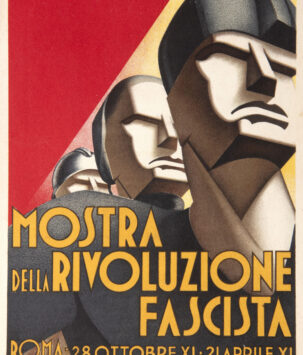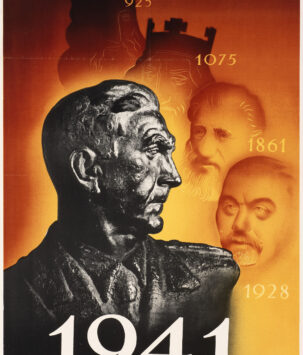Electoral Reform
Electoral poster from Nagano Prefecture promoting he electoral reform (or electoral purge) movement, a program instituted by the Imperial Japanese government to address electoral fraud and corruption. Such abuses were rampant during Japan’s pre-war liberal and democratic phase, which lasted until the end of the Taisho era. The nationalist governments that followed would reverse these trends, taking a harsher stance towards political corruption as a whole. Intended as a grassroots movement with state backing, the citizenry would receive patriotic inculcation alongside these anti-corruption campaigns, and is reflected in the triumphant, patriotic messaging of the poster.
The nationalist ethos behind the bureaucratic reforms promoted by this poster are evident in the traditional Japanese motifs featured within it, including cherry blossoms and the silhouette of a mounted samurai warrior. The silhouette featured is from a statue in front of the Imperial Palace in Tokyo of a famous samurai commander by the name of Kusunoki Masashige. He was idealized as a national hero in pre-war Japan as a role model of samurai virtue for his unwavering loyalty to the medieval Emperor Go-Daigo. Revered as the embodiment of the ancient bushido warrior code, Kusunoki Masashige is alleged to have declared “If only I had seven lives that I could give the Emperor!” before sacrificing himself in the line of duty. This has since resulted in the coinage of the Japanese lexeme ‘Shichi-sho Hokoku‘ (Seven Lives for the Nation), based off of this famous 14th-century quote. The lexeme would be frequently employed by Imperial Japanese soldiers, particularly the kamikaze pilots, who understood it as the ultimate proclamation of loyalty and self-sacrifice.
Th cherry blossoms featured herein serve as yet another traditional motif from Japanese culture, with its ephemerality heavily tied to the notion self-sacrifice. The lyrics of a famous military composition illustrates this dogma best by comparing the ephemeral bloom of the sakura (cherry blossom) to that of the destiny of Japan’s soldiers, both in fatalistic terms: “Cherry blossoms only bloom prepared to fall, so let us scatter like cherry blossoms in the wind, for the sake of our nation.”
Poster reads (from right to left, top to bottom): Election Purge | Election date: April 30th | Show Japan’s Spirit at the Elections | Nagano Prefecture
Free shipping on orders over $50!
- Satisfaction Guaranteed
- No Hassle Refunds
- Secure Payments
Electoral poster from Nagano Prefecture promoting he electoral reform (or electoral purge) movement, a program instituted by the Imperial Japanese government to address electoral fraud and corruption. Such abuses were rampant during Japan’s pre-war liberal and democratic phase, which lasted until the end of the Taisho era. The nationalist governments that followed would reverse these trends, taking a harsher stance towards political corruption as a whole. Intended as a grassroots movement with state backing, the citizenry would receive patriotic inculcation alongside these anti-corruption campaigns, and is reflected in the triumphant, patriotic messaging of the poster.
The nationalist ethos behind the bureaucratic reforms promoted by this poster are evident in the traditional Japanese motifs featured within it, including cherry blossoms and the silhouette of a mounted samurai warrior. The silhouette featured is from a statue in front of the Imperial Palace in Tokyo of a famous samurai commander by the name of Kusunoki Masashige. He was idealized as a national hero in pre-war Japan as a role model of samurai virtue for his unwavering loyalty to the medieval Emperor Go-Daigo. Revered as the embodiment of the ancient bushido warrior code, Kusunoki Masashige is alleged to have declared “If only I had seven lives that I could give the Emperor!” before sacrificing himself in the line of duty. This has since resulted in the coinage of the Japanese lexeme ‘Shichi-sho Hokoku‘ (Seven Lives for the Nation), based off of this famous 14th-century quote. The lexeme would be frequently employed by Imperial Japanese soldiers, particularly the kamikaze pilots, who understood it as the ultimate proclamation of loyalty and self-sacrifice.
Th cherry blossoms featured herein serve as yet another traditional motif from Japanese culture, with its ephemerality heavily tied to the notion self-sacrifice. The lyrics of a famous military composition illustrates this dogma best by comparing the ephemeral bloom of the sakura (cherry blossom) to that of the destiny of Japan’s soldiers, both in fatalistic terms: “Cherry blossoms only bloom prepared to fall, so let us scatter like cherry blossoms in the wind, for the sake of our nation.”
Poster reads (from right to left, top to bottom): Election Purge | Election date: April 30th | Show Japan’s Spirit at the Elections | Nagano Prefecture





